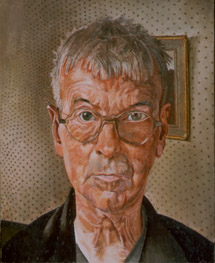A Quote by Matthew Zapruder
[My poems] of course, it's symbolic, in the way that things in a poem can be - that is, pointing to something beyond its mere ordinary meaning, while also retaining all the qualities of that ordinary meaning. In other words, it's a bear, but it's also suggesting something else, just by virtue of the attention to it. But it's not "symbolic" in that way we are taught to think about things in poems.
Related Quotes
I think all writing is about writing. All writing is a way of going out and exploring the world, of examining the way we live, and therefore any words you put down on the page about life will, at some level, also be words about words. It's still amazing, though, how many poems can be read as being analogous to the act of writing a poem. "Go to hell, go into detail, go for the throat" is certainly about writing, but it's also hopefully about a way of living.
While self-interest arising from the enjoyment of meat eating is obviously one reason for its entrenchment, and inertia another, a process of language usage engulfs discussions about meat by constructing the discourse in such a way that these issues need never be addressed. Language distances us from the reality of meat eating, thus reinforcing the symbolic meaning of meat eating, a symbolic meaning that is intrinsically patriarchal and male-oriented. Meat becomes a symbol for what is not seen but is always there--patriarchal control of animals and of language.
Keats's odes are among my favorite poems ever. As are Neruda's. So yes, I think my poems are odes, though I really just see those titles as ways of more or less orienting the poem. I've never thought about this until now, but I guess you could say that one effect of all the titles, their pervasiveness in the book, might be to once again, as so many other things do, put into question the meaning of the word "for," which I suppose is one of the great human questions: what is all this for? Why, and for whom, are we doing whatever we are doing?
I am attracted to looking at the different things language can mean even in one sometimes quite ordinary utterance. Writing is partly about listening closely to yourself as you think or compose and being aware of the different tensions and weights among the words, the different directions any one of them could lead. I like to play with the multiplicity and instability of meaning partly out of a sense of adventure, to see where that takes me and partly in a whistling past the graveyard kind of way because, of course, sensing stable meaning fall away can be scary.
Something can be symbolic without being a mere stand-in or vessel, which just brings us away from the true mystery and dread, into some boring version of what we already know. So what you say is true, in that the bear is a kind of parallel to the speaker, or imagined as such, but also very different. So if it's a symbol it is - ahem - a polysemous one.
As soon as you look at the world through an ideology you are finished. No reality fits an ideology. Life is beyond that. That is why people are always searching for a meaning to life. But life has no meaning; it cannot have meaning because meaning is a formula; meaning is something that makes sense to the mind. Every time you make sense out of reality, you bump into something that destroys the sense you made . Meaning is only found when you go beyond meaning.
A story is a way to say something that can't be said any other way, and it takes every word in the story to say what the meaning is. You tell a story because a statement would be inadequate. When anybody asks what a story is about, the only proper thing is to tell them to read the story. The meaning of fiction is not abstract meaning but experienced meaning.





































